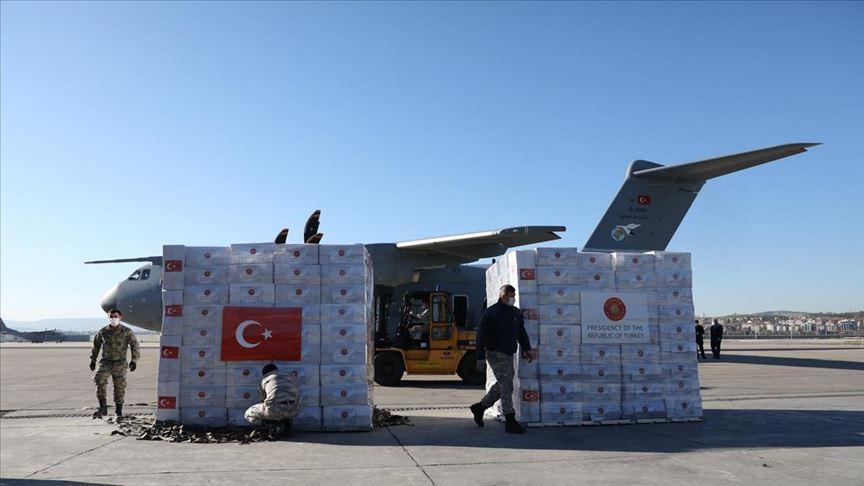
Turkey provided medical assistance to 125 countries amid the novel coronavirus pandemic, President Recep Tayyip Erdoğan said on June 14.
Speaking during the 12th International Conference on Islamic Economics and Finance via a video link, Erdoğan said that Turkey is among the countries which are tacking the pandemic period with the least damage.
“In addition to meeting the needs of our own people, we have provided medical assistance to 125 countries around the world,” he said.
Pointing out the country's first-quarter growth of 4.5 percent, Erdoğan said that Turkey has shown that it distinguished itself positively from other countries not only in the health sector but also in the economy.
“With the realization of the normalization calendar, production, trade, and tourism [sectors] have started to revive,” Erdoğan added.
'Islamic economy can lead out of crisis'
Islamic tools offer a “key” to get out of the economic woes the world is now facing, Erdoğan said.
“Over-financing has created a bloated economic model, which acts only over concern about unearned income, without considering social and human costs,” he added.
Though addressing long-term developments, his remarks took place against the backdrop of economic fallout from the coronavirus pandemic.
“To finance long-term large infrastructure investments, the use of products such as sukuk should be expanded,” Erdoğan added, referring to Islamic bonds.
“Contrary to what has been promised, the distribution of income and wealth is gradually deteriorating all over the world, and the gap between the countries widened,” he also said.
“Every crisis that started in the financial sector quickly spreads to the real sector and creates an army of the new unemployed,” he warned.
Earlier this year, credit rating agency Moody's announced that Turkey's Islamic banking assets are set to double within a decade, as government initiatives drive growth in the sector.
Turkey has positioned itself to be a hub for participation banking and Islamic finance.
Istanbul Airport, a mark of Turkey’s 2023 goals
In the meantime, Erdoğan said that with its target to serve 200 million passengers annually, Istanbul Airport is one of the symbols of Turkey's 2023 centennial goals.
Speaking at the opening ceremony of third runway at Istanbul Airport, the president said the airport has become "Turkey's pride" since its inauguration in 2018.
The airport now gained its third independent runway, the second tower, and a new taxiway, he said.
"We managed to increase the flights from 60 destinations abroad to 350. Air cargo capacity, which was 303 tons per day, has reached 2,500 tons," Erdoğan added.
A state guest house and mosque have also been added to the range of services at the facility.
The international airport, whose first phase officially opened in October 2018, is one of the most important and largest airports in the world with around 100 million annual passenger capacity.
It is projected to serve 200 million passengers annually with full capacity after the completion of all four phases with six runways by 2028.
The airport has thus far hosted a total of 423,000 flights and 65 million passengers, including 107,000 domestic flights and 316,000 international flights.
Touching upon transportation and infrastructure investments in Turkey, Erdogan said: "We increased the number of road tunnels from 83 to 395 and their length from 50 km [31 miles] to 523 km [325 miles]."
Additionally, highways in the country have been increased from 1,714 km (1,065 miles) to over 3,100 km (1,926 miles), he added.